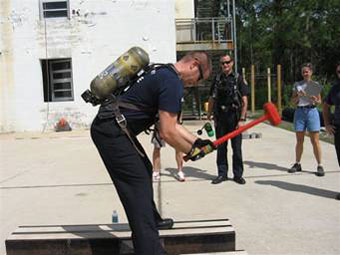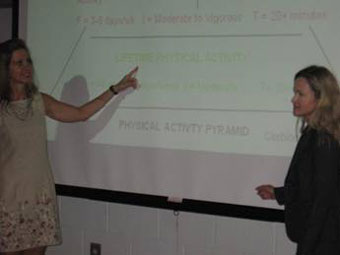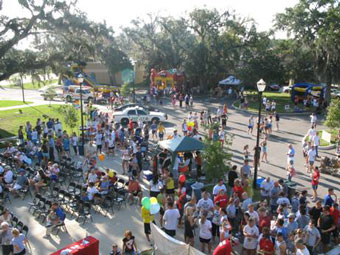By APTA
A frequently forgotten segment of our community are the public servants who keep our cities running well and safely. If we don’t hear from them we assume everything is okay. But if they aren’t functioning well our cities and our safety may suffer. What better place to start building a healthier community than by helping those who help us, our public servants?
Being interested in the health and wellbeing of our communities, there are many levels at which we may begin to make a positive difference in the lives of our public servants. Here is an example of supporting physical activity efforts ― progressive guidelines used by physical therapists in Florida to incorporate physical activity into their community – Evaluation, Education, and Integration.
Evaluation – Look for occasions to assess and evaluate levels of physical fitness in the public servants in your city. This can open doors for exercise prescription according to the Physical Activity Guidelines. For instance, employment screenings and training assessments are a part of many public servants’ jobs. Research indicates that physical activity is beneficial to mental, emotional, and physical health and wellbeing. Physical activity also results in improved work-site morale, increased productivity, and decreased worker compensation claims. http://aspe.hhs.gov/health/reports/physicalactivity/
These are just a few benefits to both the employer and employee that make living an active, well lifestyle appealing.

St. Johns County Fire-Rescue Job Function Training assessment.
Education– Look for the opportunities to educate your “local leaders” on the value and importance of living an active, well lifestyle. Brown Bag lunch series are often conducted by various departments to provide instruction and incentive to the employees. Most public servants are required to attend mandatory in-service trainings, so consider becoming a part of the in-service curriculum by adding a wellness/physical activity component. As movement experts, physical therapists are uniquely qualified to serve as consultants on a variety of physical wellness issues, not only including rehabilitation, but also wellness and prevention.

Mandatory Wellness In-Service Block Training for county law enforcement.
Integration– Face-to-face group instruction is great, but not always possible. Think about alternate modes of delivering information on ways that public servants may integrate physical activity and wellness into their lifestyles. Develop a CD/DVD they can keep in their Human Resource department that they can access at any time. Better yet, make physical activity a part of the community and invite them to attend. Organize a community event, a 5 K run/walk, a family fun day, or the like….include everyone. You will be surprised at what this can do for the entire city.

Family Fun Day/5K hosted annually at the University of St. Augustine for Health Sciences, St. Augustine, FL.
As you begin to implement some of these ideas remember:
Public servants will need to know why they need physical activity in their lives. EVALUATE them to establish a need and give them a “why”. Then, EDUCATE them on how to be physically active and well. Finally, INTEGRATE physical activity into their lives and the community. As you prepare to help those who help us consider:
- What can you do to Evaluate, Educate and/or Integrate physical activity for your public servants and community?
- Do you have staff or employees within your organization qualified to begin these strategies? If not, can you hire a consultant? Physical therapists are uniquely qualified to integrate movement and physical activity for both rehabilitation and wellness.
Written by guest bloggers: Lisa A. Chase, PhD, PT; Megann Schooley, PT, DPT, MTC, CSCS